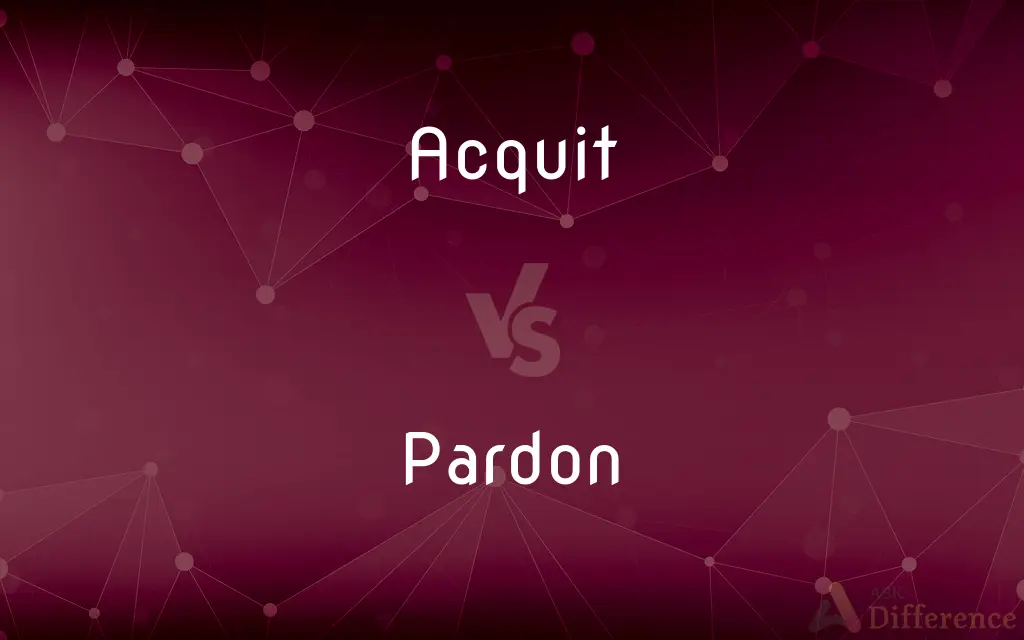Acquit vs. Pardon — What's the Difference?

Difference Between Acquit and Pardon
ADVERTISEMENT
Compare with Definitions
Acquit
(Law) To find not guilty of a criminal offense.
Pardon
A pardon is a government decision to allow a person to be relieved of some or all of the legal consequences resulting from a criminal conviction. A pardon may be granted before or after conviction for the crime, depending on the laws of the jurisdiction.Pardons can be granted in many countries when individuals are deemed to have demonstrated that they have "paid their debt to society", or are otherwise considered to be deserving of them.
Acquit
To conduct (oneself) in a specified manner
Acquitted herself well during the interview.
Pardon
The action of forgiving or being forgiven for an error or offence
He obtained pardon for his sins
Acquit
(Archaic) To release or discharge from an obligation, such as a debt.
ADVERTISEMENT
Pardon
Forgive or excuse (a person, error, or offence)
I know Catherine will pardon me
Acquit
(Obsolete) To repay.
Pardon
A request to a speaker to repeat something because one did not hear or understand it
‘Pardon?’ I said, cupping a hand to my ear
Acquit
(transitive) To declare or find innocent or not guilty.
Pardon
To release (a person) from punishment or disfavor for wrongdoing or a fault
A convicted criminal who was pardoned by the governor.
Acquit
(transitive) To discharge (for example, a claim or debt); to clear off, to pay off; to fulfil.
Pardon
To allow (an offense or fault) to pass without punishment or disfavor.
Acquit
(transitive) Followed by of (and formerly by from): to discharge, release, or set free from a burden, duty, liability, or obligation, or from an accusation or charge.
The jury acquitted the prisoner of the charge.
Pardon
To make courteous allowance for; excuse
Pardon me, I'm in a hurry.
Acquit
(reflexive) To bear or conduct oneself; to perform one's part.
The soldier acquitted herself well in battle.
The orator acquitted himself very poorly.
Pardon
The act of pardoning.
Acquit
(reflexive) To clear oneself.
Pardon
Exemption of a convicted person from the penalties of an offense or crime by the power of the executor of the laws.
Acquit
Past participle of acquit.
Pardon
An official document or warrant declaring such an exemption.
Acquit
To release, to rescue, to set free.
Pardon
Allowance or forgiveness for an offense or a discourtesy
Begged the host's pardon for leaving early.
Acquit
To pay for; to atone for.
Pardon
Roman Catholic Church An indulgence.
Acquit
Acquitted; set free; rid of.
Pardon
Forgiveness for an offence.
Acquit
To discharge, as a claim or debt; to clear off; to pay off; to requite.
A responsibility that can never be absolutely acquitted.
Pardon
(legal) An order that releases a convicted criminal without further punishment, prevents future punishment, or (in some jurisdictions) removes an offence from a person's criminal record, as if it had never been committed.
Acquit
To pay for; to atone for.
Pardon
(transitive) To forgive (a person).
Acquit
To set free, release or discharge from an obligation, duty, liability, burden, or from an accusation or charge; - now followed by of before the charge, formerly by from; as, the jury acquitted the prisoner; we acquit a man of evil intentions.
Pardon
(transitive) To refrain from exacting as a penalty.
Acquit
To clear one's self.
Pardon
To grant an official pardon for a crime.
Acquit
Pronounce not guilty of criminal charges;
The suspect was cleared of the murder charges
Pardon
Often used when someone does not understand what another person says.
Acquit
Behave in a certain manner;
She carried herself well
He bore himself with dignity
They conducted themselves well during these difficult times
Pardon
The act of pardoning; forgiveness, as of an offender, or of an offense; release from penalty; remission of punishment; absolution.
Pardon, my lord, for me and for my tidings.
But infinite in pardon was my judge.
Pardon
An official warrant of remission of penalty.
Sign me a present pardon for my brother.
Pardon
The state of being forgiven.
Pardon
A release, by a sovereign, or officer having jurisdiction, from the penalties of an offense, being distinguished from amnesty, which is a general obliteration and canceling of a particular line of past offenses.
Pardon
To absolve from the consequences of a fault or the punishment of crime; to free from penalty; - applied to the offender.
In this thing the Lord pardon thy servant.
I pray you, pardon me; pray heartily, pardon me.
Pardon
To remit the penalty of; to suffer to pass without punishment; to forgive; - applied to offenses.
I pray thee, pardon my sin.
Apollo, pardonMy great profaneness 'gainst thine oracle!
Pardon
To refrain from exacting as a penalty.
I pardon thee thy life before thou ask it.
Pardon
To give leave (of departure) to.
Even now about it! I will pardon you.
Pardon
The act of excusing a mistake or offense
Pardon
A warrant granting release from punishment for an offense
Pardon
The formal act of liberating someone
Pardon
Accept an excuse for;
Please excuse my dirty hands
Pardon
Grant a pardon to;
Ford pardoned Nixon
The Thanksgiving turkey was pardoned by the President
Share Your Discovery

Previous Comparison
Scholar vs. Fellow
Next Comparison
Stary vs. Starry













































